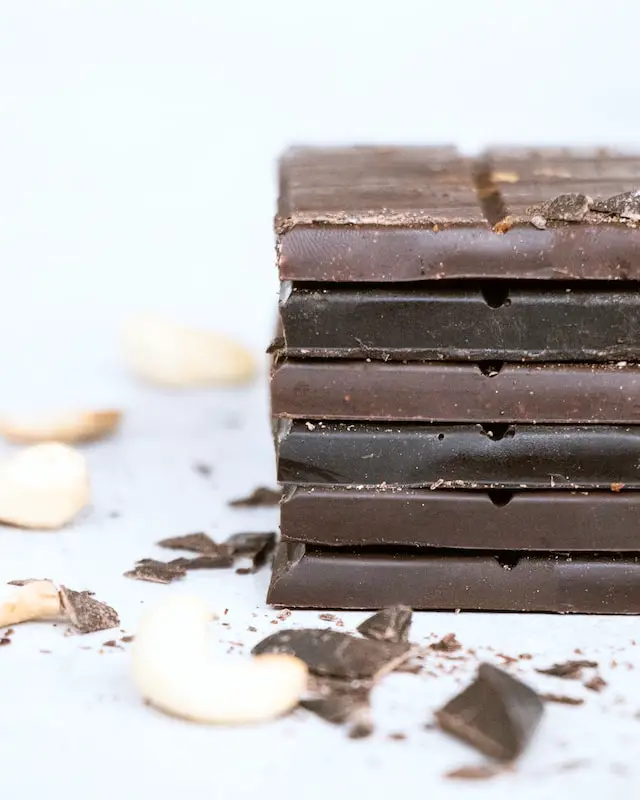Dark chocolate has been widely recognized as a healthy snack, offering various health benefits when consumed in moderation.
However, just like anything else, too much of a good thing can lead to negative consequences.
Eating too much dark chocolate can have adverse effects on your body and health. In this article, we will explore what happens if you eat too much dark chocolate.

Dark chocolate is rich in flavonoids, which have antioxidant properties and can help to protect your body against oxidative stress.
Dark chocolate has also been linked to improved heart health, lowered blood pressure, and reduced risk of stroke.
However, despite these benefits, consuming excessive amounts of dark chocolate can lead to several health problems.
- Weight Gain: Dark chocolate is high in calories and fat. Eating too much dark chocolate can contribute to weight gain, leading to obesity and related health problems.
- Tooth Decay: Dark chocolate contains sugar, which can contribute to tooth decay when consumed in excess.
- Stomach Upset: Eating too much dark chocolate can cause digestive problems, including nausea, vomiting, and diarrhea.
- Headaches: Dark chocolate contains caffeine, which can trigger headaches in some people, especially if consumed in large amounts.
- Insomnia: The caffeine content in dark chocolate can also interfere with sleep, leading to insomnia and other sleep disorders.
- Iron Overload: Dark chocolate contains high levels of iron. Consuming too much dark chocolate can lead to iron overload, which can be harmful to people with conditions such as hemochromatosis.
- Allergic Reactions: Dark chocolate can cause allergic reactions in some people, leading to symptoms such as hives, itching, and difficulty breathing.
- High Blood Pressure: Although dark chocolate has been shown to lower blood pressure when consumed in moderation, consuming excessive amounts can have the opposite effect, leading to high blood pressure and related health problems.
- Mood Swings: Dark chocolate contains phenylethylamine, a compound that can affect mood and cause mood swings when consumed in large amounts.
While dark chocolate can offer various health benefits when consumed in moderation, overconsumption can lead to several negative consequences.
It is recommended to limit your intake of dark chocolate to no more than 1-2 ounces per day to avoid these negative effects. As with any food, moderation is key.
Health Benefits Of Eating It In Moderation
Dark chocolate, when consumed in moderation, can offer various health benefits due to its high content of flavonoids and antioxidants.

Flavonoids are plant-based compounds that have antioxidant properties and can help to protect your body against oxidative stress. Here are some of the health benefits of eating dark chocolate in moderation:
- Improved Heart Health: Dark chocolate has been linked to improved heart health due to its ability to lower blood pressure, reduce inflammation, and improve blood flow. Studies have shown that regular consumption of dark chocolate can lower the risk of heart disease.
- Reduced Risk of Stroke: Dark chocolate has been shown to reduce the risk of stroke in some people. A study published in the journal Heart found that consuming chocolate on a regular basis was associated with a lower risk of stroke in women.
- Improved Brain Function: Dark chocolate contains caffeine and theobromine, which can improve brain function and cognitive performance. Studies have shown that consuming dark chocolate can improve attention, reaction time, and memory.
- Reduced Risk of Diabetes: The flavonoids in dark chocolate can help to improve insulin sensitivity and reduce the risk of diabetes. A study published in the Journal of Nutrition found that consuming dark chocolate can improve glucose metabolism in people with impaired glucose tolerance.
- Reduced Inflammation: The antioxidants in dark chocolate can help to reduce inflammation in the body, which can help to prevent chronic diseases such as arthritis, heart disease, and cancer.
- Improved Mood: Dark chocolate contains phenylethylamine, a compound that can stimulate the release of endorphins and improve mood. Consuming dark chocolate in moderation can help to reduce stress and improve feelings of happiness and well-being.
- Improved Skin Health: The flavonoids in dark chocolate can help to protect the skin against UV damage and improve skin hydration and texture. Consuming dark chocolate in moderation can help to maintain healthy and youthful-looking skin.
Consuming dark chocolate in moderation can offer various health benefits due to its high content of flavonoids and antioxidants.
It is recommended to choose dark chocolate with at least 70% cocoa solids and to limit your intake to no more than 1-2 ounces per day to reap the benefits. As with any food, moderation is key.
Can It Make You Lose Weight?
While dark chocolate does contain calories and fat, there is some evidence to suggest that it may aid in weight loss when consumed in moderation as part of a healthy diet.
One way that dark chocolate may contribute to weight loss is by reducing cravings for sweet and fatty foods.
A study published in the journal Nutrition found that participants who consumed dark chocolate had reduced cravings for sweet, salty, and fatty foods compared to those who consumed milk chocolate or no chocolate at all.

Another way that dark chocolate may aid in weight loss is by improving satiety, or the feeling of fullness after a meal.
A study published in the European Journal of Clinical Nutrition found that participants who consumed dark chocolate as a snack reported feeling more satiated and ate less food during their next meal compared to those who consumed milk chocolate.
In addition, the flavonoids in dark chocolate may help to improve insulin sensitivity and reduce inflammation, both of which are factors that can contribute to weight gain and obesity.
Conclusion
Dark chocolate is a delicious treat that offers various health benefits when consumed in moderation. It is high in flavonoids and antioxidants, which can improve heart health, reduce the risk of stroke and diabetes, improve brain function and mood, and improve skin health.
When choosing dark chocolate, it is important to choose varieties with at least 70% cocoa solids and to limit intake to no more than 1-2 ounces per day. Consuming large amounts of dark chocolate can contribute to weight gain and other negative health effects.
Overall, dark chocolate is a delicious and nutritious treat that can be enjoyed in moderation as part of a healthy diet and lifestyle.
